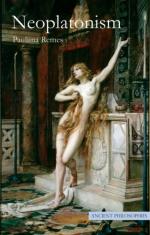|
This section contains 8,951 words (approx. 30 pages at 300 words per page) |

|
General Characterization
Neoplatonism was the dominant philosophical current in late antiquity, and it had a lasting influence in the Middle Ages when it was adopted by Christian and Muslim thinkers. The term Neoplatonism was coined in the late eighteenth century and was used (in a rather pejorative sense) to distinguish authentic Platonism (as found in Plato's dialogues) from the later systematization and transformation(s) it underwent in the third through fifth centuries, starting with Plotinus.
By using the term Neoplatonism, historians of philosophy wanted to dissociate themselves from the perspective that for centuries had determined, if not distorted, the interpretation of Plato. Yet Plotinus would have been surprised if he had known he would once be called a Neoplatonist. He never intended to be anything other than a faithful interpreter of Plato's doctrines, coming, as he saw it, after centuries of neglect and distortion during which Stoicism and...
|
This section contains 8,951 words (approx. 30 pages at 300 words per page) |

|


